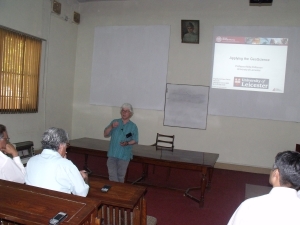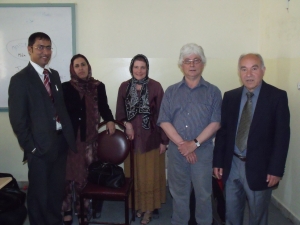Kabul Diary by Mike Petterson
23 May 2010
My time in Kabul ended with flight PK 250 from Kabul to Peshawar, Pakistan. The mainly empty propeller plane took its handful of passengers eastwards across the Khyber. We headed over the Kabul Plain and the sharp, ice‐covered Hindu Kush mountains, beyond the greener Jalalabad Valley, over the Khyber and downwards to Peshawar.
Before I left Kabul I had a meeting with officers serving at the British Council, including the Director, Tony Jones and colleagues Julia Cave Smith and Gulghutai. The mission of the British Council is badly needed in Afghanistan as there is a high demand for the English language and educational connections with the UK. Like many expatriates working with the various arms of international government in Afghanistan, British Council staff are highly dedicated with a strong sense of public service. As Kabul is not a family‐friendly posting (for obvious reasons) most people work in Afghanistan separated from spouses, partners, children, friends and loved ones. Lifestyles are necessarily constrained by the security realities and the strong sense of care of duty governments have for their staff in difficult postings such as Kabul.
I am personally indebted to DfID and the British Council, as they are funding and supporting my work in Kabul. The objective of the project is to form links between the University of Leicester and Kabul. I am seeking additional funding to also bring in to play the University of Peshawar and other UK universities. The purpose of the project is to strengthen university departments, develop teaching materials, offer staff development and research opportunities to staff, and improve the teaching experience of students.
Staff at Kabul University are dedicated and work extremely hard in difficult circumstances. Teaching materials are limited, research laboratory equipment is sparse, internet connections are slow and unreliable, and computers are a premium. Typical of countries that have suffered protracted war, is the phenomenon of the ‘missing generation’ with the age profile of staff reflecting this: older highly experienced staff and newly‐qualified staff looking for guidance, additional qualifications and access to international standard teaching materials and research work together, missing the experience link across the generations. We hope that our project will help a little in strengthening skills and materials. Demand is essentially infinite and resources are limited. The future security of this region depends heavily on education and employment opportunities – without these, long term, sustainable peace is unlikely.
If anyone can help at all or has ideas about attracting resources to provide more Afghans with greater access to educational resources and grants for Masters and PhD level qualifications, please contact me (mp329@le.ac.uk). It would be tremendous to think that in five or 10 years time we had helped to build a strong university: a beacon of peace in a land of uncertainty.
Another strand of the process is to bring in Peshawar University as a project partner. Peshawar is a wonderful gateway city to the Khyber – it was the very NW frontier edge to the British Raj. Peshawaris have much in common with Kabulis including language, Pashtoon‐dominated tribal roots and a partly‐common history. The two cities have at times been part of the same country and at others separated – today by the Durand Line separating Afghanistan from Pakistan. Peshawar is a bustling city with a history extending back to Gandharan Buddhism and beyond. It has played host (and continues to play host) to millions of Afghan refugees who have fled their homeland over the Khyber in search of peace and a new life, as countless predecessors have done throughout history.
I have been lucky enough to have been associated with Peshawar University for almost 30 years and in that time have seen its fortunes ebb and flow. Presently there is good news with new equipment and a forward‐looking Higher Education Commission who have strategically funded hundreds, if not thousands, of Pakistanis to obtain PhD level qualifications all over the world in an attempt to strengthen the Higher Education sector within Pakistan. The University of Leicester has been the recipient of this scheme, as have many other universities. What is now required is a period of consolidation once the newly‐qualified academic staff return to their universities in the Orient. So tying in Peshawar with Kabul would be a great bonus to the project – an inspiration to Kabul University to see fellow‐Pashtoons prospering and exploring new approaches to education and research for the needs of the NW frontier and nation.
Maybe, in the long run, new countries are built, bridges constructed, networks created and alliances cemented at the direct interpersonal level. Every human connection, every hand across the dividing wall, every joint meal, shared smile and partnered work project is a step on the real road to peace. Peace comes with winning hearts and minds, breaking down barriers and providing opportunities for education and employment. Through this real, tangible hope begins and a future fit for the wonderful people of Afghanistan can begin to emerge.
Thanks for staying with me through the trip. Signing out for now.
Mike Petterson (mp329@le.ac.uk)




Pingback: Notes from Kabul « Beyond Distance Research Alliance Blog